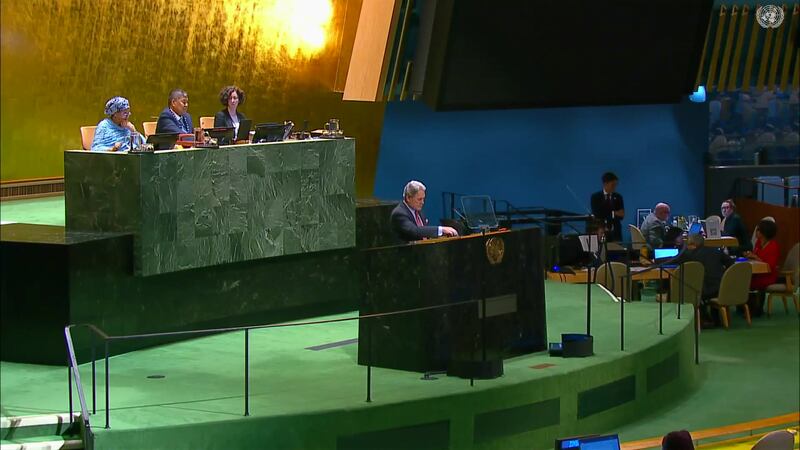Winston Peters believes the United Nations Security Council needs “a voice for small states” - and he wants it to be Aotearoa New Zealand.
The Foreign Affairs Minister, speaking before the UN General Assembly, took the opportunity to announce Aotearoa’s intention to campaign for a seat on the UN Security Council for the 2039-40 term.
“So we must do more. Demand more. And deliver more.
“We must reject and resist those who seek to conquer and control.
“We must always seek the path of peace because the lasting victories of humanity are those of peace, not war.”
Currently, there are five permanent members of the council: China, France, the Russian Federation, the United Kingdom, and the United States. There are also 10 non-permanent members elected for two-year terms by the General Assembly.
There are currently no Pacific regions represented within the council, permanent or not.
Peters said the world looks different in 2024 than it did in 1945 when the UN was created.
“Our collective institutions need to evolve and reflect contemporary realities. We need a UN Security Council that looks more like today’s world.
“Small states matter now as much as they did then. New Zealand holds the foundational belief that all states are equal and that our voices matter as much as the more powerful states represented here. It is the quality of our arguments and the principles of justice that inform them, not the size of our militaries, that should hold sway here.
“We smaller nations face many of the same challenges and share the same concerns.”
He began quoting Singapore’s Foreign Affairs Minister, Dr. Vivian Balakrishnan, who stated at the East Asia Summit Foreign Ministers’ Meeting in Laos that small states desire territorial integrity and political independence, which depend on the UN Charter for long-term planning.
“[We] must view an invasion of a smaller neighbour by a larger neighbour…as a full-frontal point of anxiety,” Balakrishnan had said.
Peters continued and said: “We small states need today’s superpowers to talk more, seek better understanding between them, and develop ways of compromising more. Rather than a zero-sum game, effecting better relations between today’s “Great Powers” only enhances global stability, and that is what we smaller nations seek.”
Veto reform
During his speech he also called for a veto reform, calling out the UN Charter for “sagging under the weight of its own potted history”.
Peters said some Permanent Members of the Security Council “consistently and frequently abuse” the power to veto, specifically calling out Russia during the invasion of Ukraine.
“When Russia, a permanent member of the Security Council, illegally invaded its neighbour, it did not just violate Article 2, paragraph 4 of the Charter, it acted in utter contempt of the Charter.
“Russia then vetoed a draft Security Council resolution condemning its actions and calling for the immediate withdrawal of its forces from Ukraine.
“Not only does Russia lack the sincerity and moral determination required to make the United Nations work, but its delinquency should be a clarion call for long overdue Security Council reform,” said the deputy Prime Minister.

He recalled Prime Minister Peter Fraser in 1946 being against the veto rights given to the Great Powers.
“The veto which can be exercised by one of the Great Powers both in regard to itself and other nations is unfair and indefensible and may, if retained and exercised, be destructive not only of the main purposes of the international organisation, but of the institution itself.
“It is very bad if one nation can hold up the advancement of mankind,” Fraser had said in 1946.
Near the end of his kōrero, the Foreign Affairs Minister referenced the conflict in Gaza, calling Hamas’ October 7 attacks “monstrous” and Israel’s response of an “overwhelming nature”.
“We are most concerned about the generational consequences of this level of suffering and violence, with no end in sight and which sees us on the precipice of an even wider conflict.”
‘New Zealand never wants to experience the catastrophe of another World War’
Peters wrapped up his speech by asking the assembly, where the “sincerity and moral determination” of the world leaders during this phase of “unacceptable violence”
“New Zealand has sacrificed many of its young men to wars in faraway lands. Fully 10 percent of the total population of New Zealand fought in the Great War, and we lost a fifth of them. So every year, on the 25th of April, we commemorate their loss at Gallipoli, the site of terrible carnage.
“This year in a dawn address we recalled that despite the horror of war on the Gallipoli Peninsula, fraternal bonds were forged between warring nations, countries who were once enemies became friends.
“New Zealand never wants to experience the catastrophe of another World War. There must never be another San Francisco conference picking up the pieces after another descent into global annihilation and human suffering,” he said.
The Foreign Affairs Minister will visit French Polynesia following his trip to New York City.

